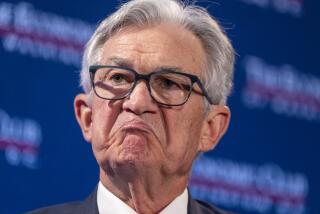Soviets Need Market Linchpins to Thrive
- Share via
My husband and I commemorated Labor Day at a Beverly Hills party attended predominantly by show business people. Despite the setting and the company, the talk was not of multipicture deals, but of the end of communism in the Soviet Union.
One producer-writer, a veteran of progressive causes, posited wistfully that the collapse of communism perhaps proved that altruism could never serve as an effective organizing principle for society. The Soviet experience seemed to suggest that unregulated, unbridled self-interest and greed might be the only sure guarantors of a healthy market economy.
I think his pessimism is unjustified. The disintegration of the Soviet economy provides decidedly mixed lessons about altruism, greed and the appropriate role of the state in economic life.
Except in its revolutionary days, the Soviet economic system had only a glancing relation to altruism. Central planning relied on material incentives to reward economic performance and party loyalty.
The distribution of economic rewards was not based on the Marxist formula “from each according to his ability, to each according to his need” but on the harshly pragmatic principle “from each according to his ability, to each according to his effort and party connections.”
True, the Soviet Union developed a broad social safety net. In addition, the prices of necessities, like food and housing, were heavily subsidized, and job security was virtually guaranteed. But as the central planning system became less productive and shortages multiplied, huge holes appeared in the safety net. Access to public services and subsidized goods depended increasingly on bribes and party networks.
In the past two years, the Soviet economy has slid into a free fall that makes the Great Depression look like a mid-course correction. Perestroika has undermined the old system, but political stalemate has stymied the development of a new one. The result is chaos in which self-interest and an eye for the main chance have replaced concerns over the policy’s welfare.
As Adam Smith himself realized, the pursuit of economic self-interest is socially beneficial only when it is embedded in a stable economic and political order. Because such an order is absent in the Soviet Union, self-interest is tearing the nation and its economy apart.
Central planning and distribution have been dismantled, but legal markets have not been created. Instead, barter among spontaneously organized groups of officials, enterprise managers and gangsters has produced a system rampant with hoarding, price-gouging and extortion. As the overall standard of living plummets, a fraction of the population is enriching itself through old bureaucratic connections.
The pursuit of self-interest may be necessary for a prosperous economy, but it is certainly not sufficient. A supportive and regulatory state is also required.
As capitalism developed, the state has come to play many critical roles. First and foremost, it encodes and enforces the rules of the game, including critical rules about ownership rights, competition and exercise of market power.
Second, it moderates the unavoidable recurrent cycles of boom and bust. Third, it addresses collective goals that lie outside the purview of self-interested economic actors--goals as diverse as regulating child labor and protecting the environment.
Even in a stable market system, however, rules alone are not sufficient to control dishonest behavior. Because it is impossible to monitor everyone’s actions at every moment in time and because all rules have loopholes, a healthy market economy depends on self-regulated self-interest. When greed becomes so powerful that it destroys self-discipline, self-interest can endanger the public good.
Most people have at least some capacity to experience emotions that encourage cooperative behavior and keep dishonest behavior in check. But how one deals with such emotions depends on the milieu in which one functions.
When each individual believes that others are behaving honestly, he is more inclined to do so. But in an environment like the Soviet Union’s today, in which rules do not exist or in which the violation of rules has become commonplace, honest behavior becomes a “chump’s game,” and breeds profiteers and criminals.
Corruption is one rational way to grapple with economic scarcity and the absence of rules. Ethnic identification is another.
How better to allocate shortages than to draw boundaries between those who qualify as a member of one’s tribe and those who don’t? Not surprisingly, throughout the Soviet Union many informal schemes for distributing scarce goods now rely on national affiliation as a rationing device. Ironically, ethnic nationalism may emerge as one of the only effective checks on individual self-interest.
The citizens of the Soviet Union often remark ruefully that socialism was the longest and most tortuous road from capitalism to capitalism. But the most successful models of capitalism today bear little resemblance to the brutal forms of capitalism that led Marx to predict its demise.
Greed and self-interest are irrepressible human characteristics and play a positive role in market economies--provided they are grounded in a strong social and political order and a strong sense of individual honesty and sympathy for the less fortunate.
Four days after the Beverly Hills party, my husband and I had dinner with a colleague who was accompanied by a recent arrival from Leningrad, who is working with a Soviet entrepreneur to establish a trading company.
Like her, there are scores of responsible and energetic individuals whose pursuit of their own self-interest could bring the Soviet economy back from the abyss--but only if the foundations for a successful market system are put in place. The most chilling aspect of the situation in the Soviet Union today is that the reformers in the leadership may prove too weak or too divided to accomplish this task.
More to Read
Inside the business of entertainment
The Wide Shot brings you news, analysis and insights on everything from streaming wars to production — and what it all means for the future.
You may occasionally receive promotional content from the Los Angeles Times.










